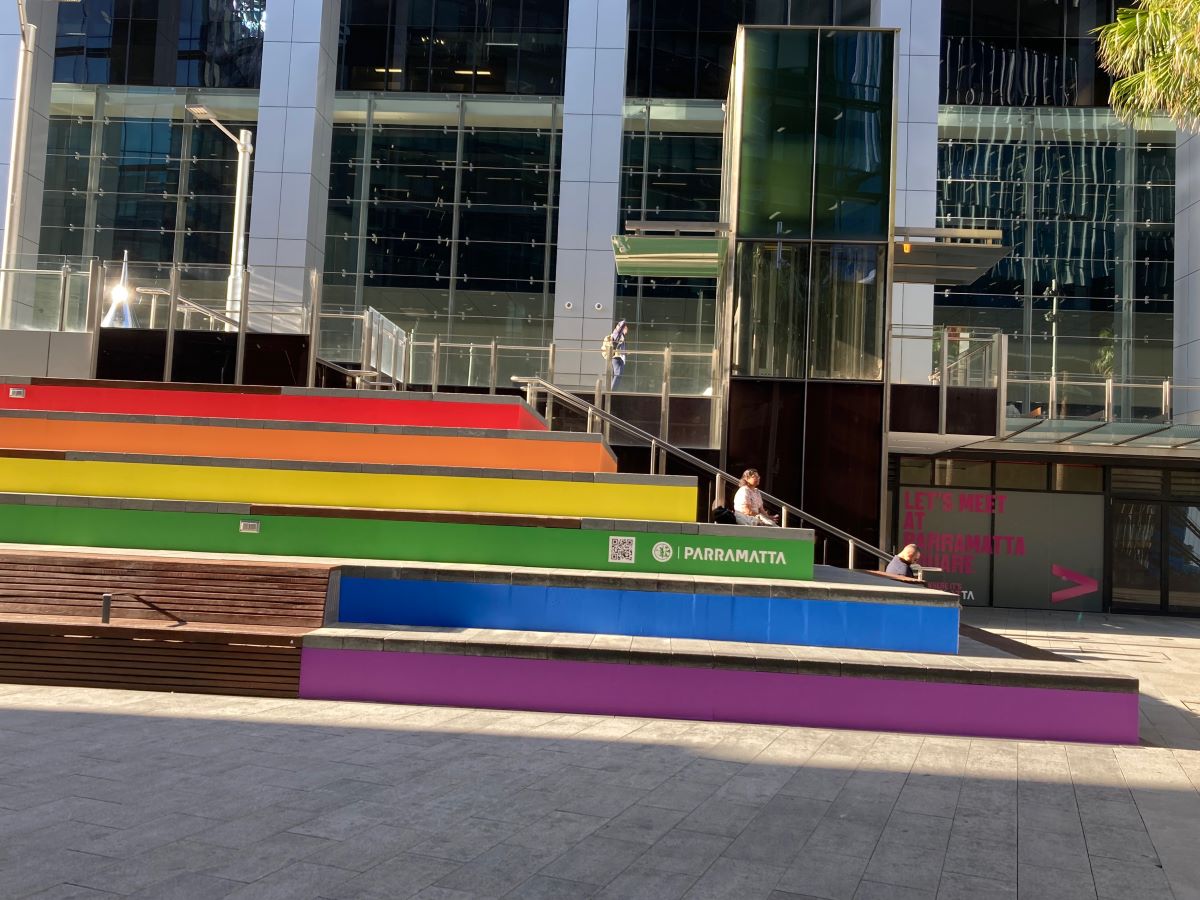It’s February, and Mardi Gras is just around the corner. While the Sydney queer community prepares for its biggest festival of the year, those in the West are torn between two worlds. Every day on my commute I walk through Parramatta Square, and every day leading up to the parade I watch council-approved decals wishing a happy Mardi Gras be progressively peeled off the steps. The stripped plastic flutters sadly in the wind, and I see pairs of young men sitting as far away from the scraps as they can.
Every day on my way to work, I tuck my he/him pin under my keffiyeh and jog for the train, hoping that no one notices.
When queerness is at its most visible, queer people in the western suburbs are at their most vulnerable. While local councils have good intentions, extending the same solidarity they do to other religious and secular holidays, there’s a big gap between the inner and outer west in terms of public acceptance.
It could be argued that this is because queer culture was mostly fostered in the city, in places like Darlinghurst, Newtown, and the University of Sydney. Queer cultures and by extension queer political organising, lives in bars and is fostered by nightclub culture. It’s telling that the queer community is weakest where there are no spaces for that culture to grow and diverge.
Where a queer community does not exist, the queer community cannot be accepted.
Queer spaces in the greater west are fewer and farther between, usually tucked away and only known about through word of mouth. They are life rafts in a sea of perceived intolerance. Rickety, underfunded, and subject to harsh backlash should they decide to be visibly and publicly queer. In the year since 2023 Sydney WorldPride, numerous Drag Story Times have been cancelled by local councils for fear of violence threatened online. It has left western Sydney queers feeling scared and abandoned by the councils who claim to support the community. When things like a Wear It Purple stall is closed in Bankstown shopping centre to “protect the public” from violent vandals, it tells us that our culture isn’t as important. That we should hide ourselves to prevent attacks that endanger others. That hate crimes are our fault for not staying in our lane.
Hiding ourselves away doesn’t make us any more publicly acceptable or accessible. Queer visibility, by queer people, is what leads to more tolerance. Shutting these events down has only led to more attacks, more vitriol, more fear.
Most recently, The Hills Shire and Cumberland Councils have put forward and passed motions banning the council from externally employing drag performers to read storybooks to young children. Both motions, identical in their wording, labelled drag queens as “sexualised material designed to target children.” The ban would be a direct attack on queer culture in those areas, showing direct opposition to the lives and interests of an already disenfranchised community. They would strip the queer community of a major avenue to share our culture with the public. An avenue that allows us to meet each other, to build a stronger community and stand together.
Both motions were passed.
In Cumberland’s case, queer activists protesting the motion were driven away by people identified as members of Christian Lives Matter. This is a violent hate group tied to conspiracy theorists, the One Nation Party and the former United Australia Party. A video released by Pride In Protest (PiP) features people calling for PiP to “go back to Newtown” and that “[CLM affiliates] don’t go to your neighbourhood to preach our ideology!”
Newtown community members know that this is false, given the rosary procession and harassment of queer people that took place on King St in late June 2023.
It’s clear that this hate is only allowed to grow and fester in areas where the Queer community is blocked from gathering and being ourselves. Where we live in fear of gathering in case the Right attacks us. Being queer in the west means a constant fear of being heckled or assaulted should you decide to proudly display your identity.
But being queer in the west can be much more than that. While most queer activism happens in the inner west and the city, we can fight for ourselves in our own homes. In our own streets. Visibility is the greatest weapon we have in a culture war, and solidarity is our greatest strength. Building a strong, visible community is a long battle, but one that I believe will be worth it in the long run. We cannot rely on the likes of the Labor party to slowly and quietly introduce tolerance, when they are all too happy to bow to the far right like they did in Cumberland. The 78ers had the right idea, creating a visible fight for our rights.
It’s March, and Mardi Gras has come and gone. While things like the equality bill have been delayed and the queer community returns to its quiet existence until next year, I want to dream of a new future. Every day on my way home from work, I walk past grandstands that used to be a message of hope. Hope for acceptance in my community, hope for safety in my own home.
I miss the Parra Mardi Gras stairs. I miss their potential, and I hope to see them again.





